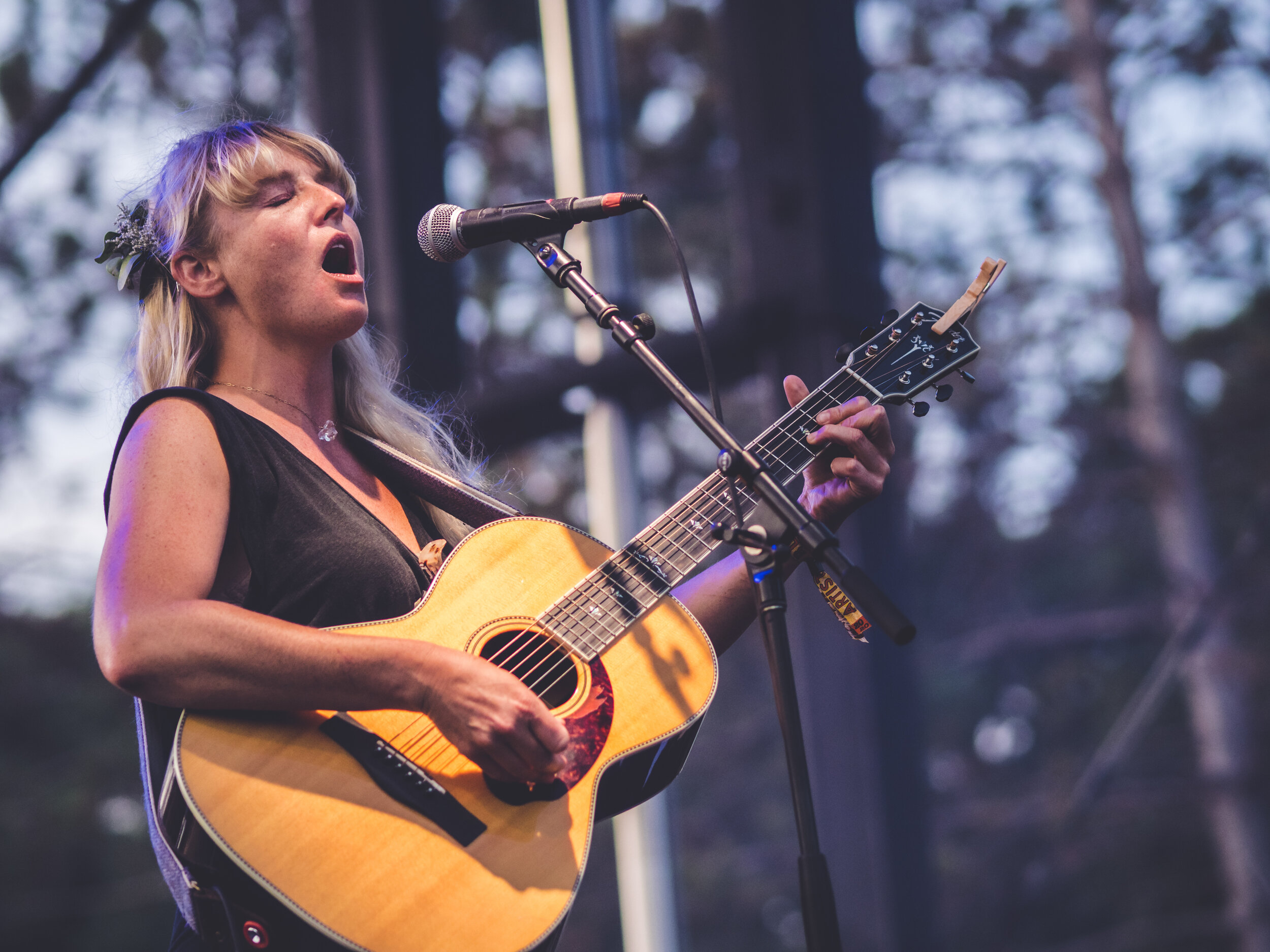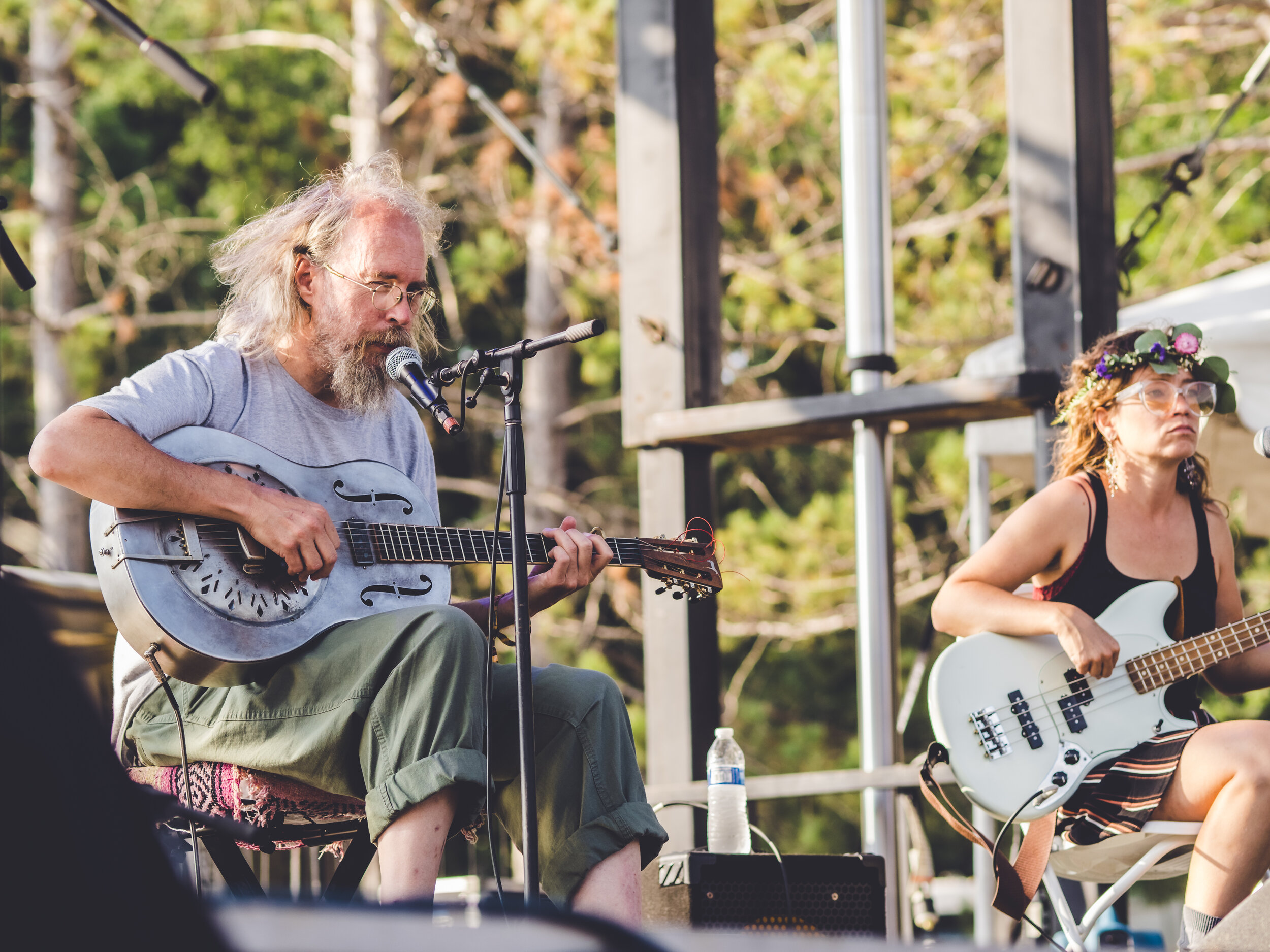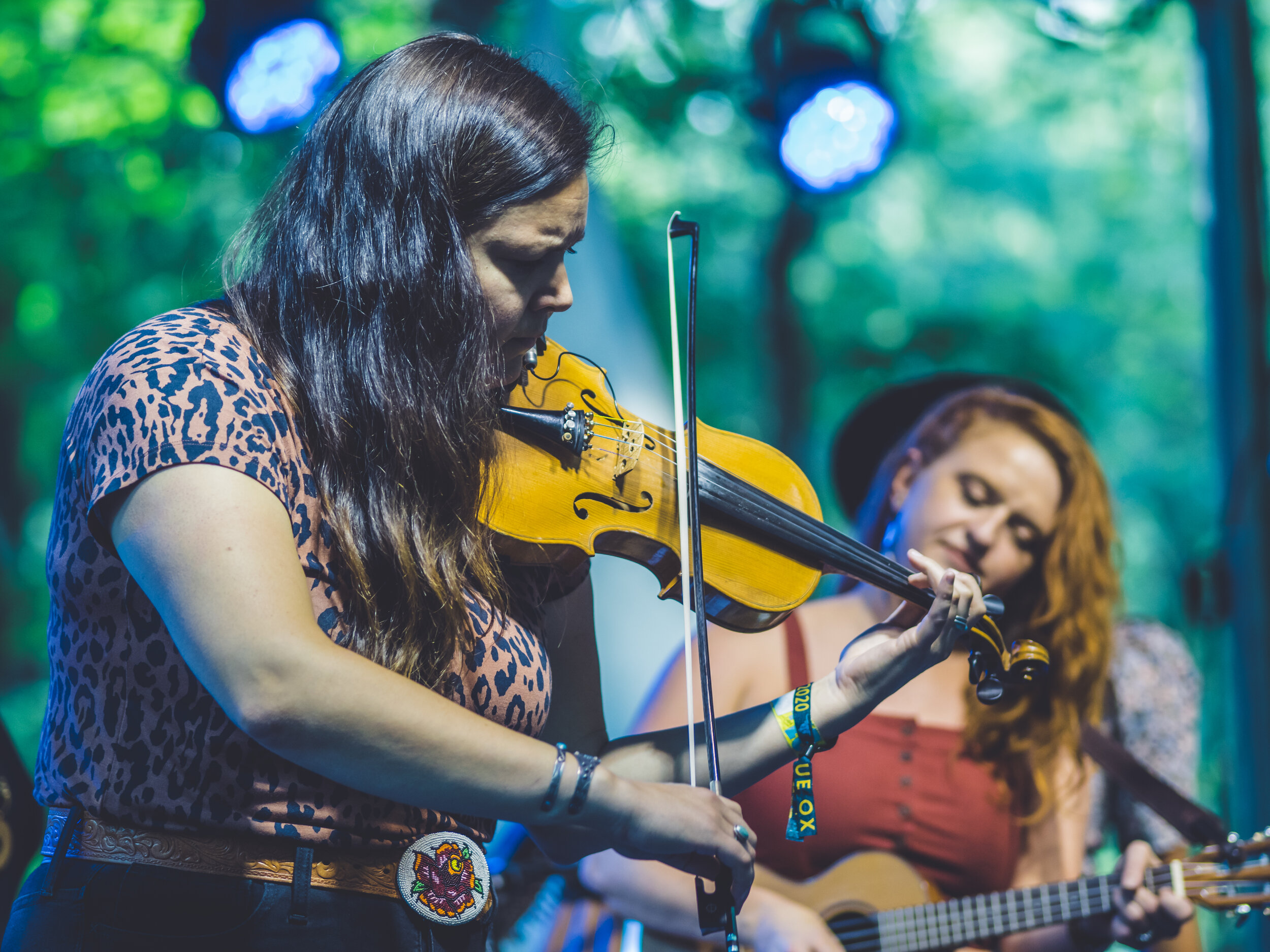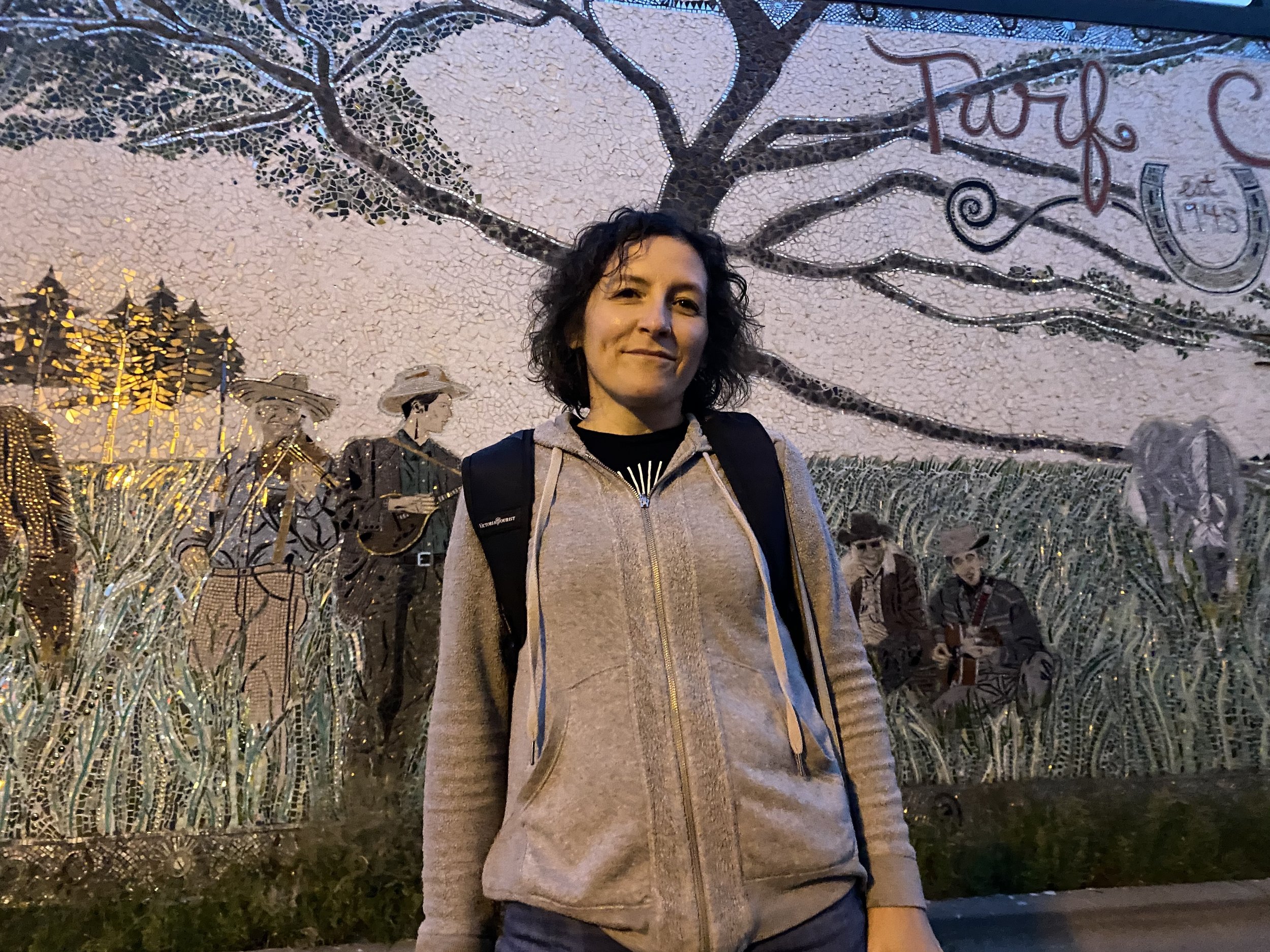Event Review: 2021 Blue Ox Music Festival in Eau Claire, Wisconsin
Carol took a real adventure in Americana—four nights of camping and three days of music in the middle of the woods in Wisconsin. Here’s her coverage of this epic event, with photos by Tom Smouse and Laura Lee Buhman!
This site is called Adventures in Americana because I’m going out of my musical comfort zone, testing uncharted waters in search of an ever-widening range of Americana artists and songs. But for once I took a physical adventure and decided to attend the three-day Blue Ox Music Festival in the countryside outside Eau Claire, Wisconsin. Camping is encouraged to get the full experience, so I opted for a “glamping” package, meaning there would be a tent already set up for me with a real, fully made bed; towels and washcloths; bags of ice delivered every morning; and coffee, tea and drinking water freely available nearby.
Even so, I felt lost and more than a little nervous as I drove down dirt paths to find my tent and get settled in. Early arrival was allowed for glampers, so I came Wednesday evening—nearly 24 hours before the first act. Even though it meant an extra night “roughing it,” I wanted time to get used to my surroundings. I’m terrible with directions, naturally introverted, and insecure about trying new things, so just getting to the site and bringing my things in, learning how to close the outer door, etc., was tiring.
There was no scheduled music that first night, but from my tent I heard music in the distance, and cheering. It was exciting and tempting to try and find it, but I’m a city slicker and it was DARK out. Plus I was exhausted, having worked days, nights and weekends to get my job stuff in a good place before I left. So instead I let the distant music and the much closer frogs and crickets sing me to sleep.
I woke up a few times in the night when loud guys would walk by (“It’s my fucking camp,” insisted the first one I heard—glad he wasn’t talking to me!), but other than that I slept like a baby. (Thank goodness, because it would be the last good night of sleep I got—once the campgrounds filled up, it was nonstop partying throughout the site every day from morning till—early morning of the next day.)
Day 1: Getting Acclimated
In the morning I found coffee steps away from my tent, stuck a pin on my tent in my phone so I wouldn’t get too nervous about exploring, and set out. I thought I traversed about half the site, but when I perused the map later, I realized I’d circled maybe a quarter of it on my leisurely hour-long walk—and gone a whole different direction than I thought I had. This place was BIG, at least to an inexperienced (heck, no-experience) camper like me! And I got wildly turned around in one small camping area, so yeah, I vowed to keep that pin on my phone and chargers going whenever I was in my tent.
I knew there was a third stage somewhere in the woods, but I couldn’t find it in my wandering. The temperatures were rising—it’d get to nearly 90 both Thursday and Friday—so I gave up after a while.
The hours before the music that first day were prime relaxing time so I tried to take advantage, but with it being so hot, and feeling completely out of my element, it was hard sometimes. I was worried I’d just be tired and overheated before the show even started.
Luckily with the arrival of some friends, the sunset bringing cooler temperatures, and the music kicking in, I got a big second wind. The first act I caught, Kyle Tuttle, charmed with high-energy punky bluegrass and the occasional rambling jam-band-esque musical conversation with his fiddler and upright bass player.
Lillie Mae, a Nashville singer/songwriter/guitarist/fiddler, was the first on my list of must-sees for the festival. I’d seen her twice before at First Avenue in Minneapolis, and she was her usual dazzling self (figuratively and literally, in her shimmering silver floor-length gown). She’d brought her brother and sister to accompany her on guitar and mandolin—I didn’t know talent runs in the family! I looked her up later and realized she started her music career in a family band with her parents and siblings. Side note: Her bass player had the third cutest outfit of the festival so far, after Lillie and her sister—a pair of white overalls covered in stylized black illustrations of snakes.
The final mainstage act, the Infamous Stringdusters, brought down the house with a rousing set of bluegrass music. All the band members are equally talented vocalists so they took turns taking the lead. The sky was completely dark by then, and the festival grounds were transformed, multicolored lights illuminating the trees and piercing the darkness from the stage.
As the Stringdusters set built to its climax, my friend and I set out to find the elusive Backwoods Stage—we wanted to make sure we caught part of Mae Simpson’s midnight set. Her six-piece band kicked in at the stroke of midnight and she sauntered out. Her trademark casual T-shirt, jeans and backward baseball cap don’t prepare you for the ferociously soulful belter’s smouldering bluesy performance.
After seeing my friends to the edge of the stage area, I was tempted to go back and see more of Simpson, but I knew I had a long day of music ahead of me so I went to my tent instead. My sleepiness was tempered by FOMO as I could hear her music—and the howls of the invigorated crowd—from my bed. Brotherhood of Birds were on next and what I heard made me want to jump out of bed and go catch a song or two, but I resisted and got some much needed rest instead.
Day 2: Nonstop Magic
I managed to get a few hours of sleep and then it was time to navigate the camp showers—I’m in my late forties but I’ve never roughed it even to this extent before, so that was an adventure in and of itself! It was worth it to clean off the caked-on layers of sweat, dust and sunblock, though.
My first music adventure of the day was catching a banjo workshop by Anthony Ihrig of the High 48s. I have a banjo someone gave to me but I’ve never found time to learn it. But I found the workshop to be instructional, both for fingerpicking tips that’ll come in handy (banjo or guitar) and insight on how to gauge good bluegrass picking. Bluegrass is the least relatable branch of country music to me—which was a bit rough because this festival is heavy on bluegrass! But there were plenty of other styles of music to enjoy, luckily.
The first show of the day on the mainstage was one of the biggest reasons I wanted to come—Sunny War. It’s hard to describe her style, but her Facebook calls it blues/folk/punk, so we’ll go with that. Her poetic, evocative lyrics matched the slow burn of her voice, but the star of the show for me was her complex fingerpicking. I noticed she keeps three fingers of her right hand pressed against the body of the guitar and all those notes are somehow being made by her thumb and forefinger. War was backed by a fantastic bass player and a percussionist who used a shaker, foot tambourine and something I’ve seen before but only just looked up and learned is called a cajon—a wooden box you sit on and beat with your hands. Her set was captivating and over too quickly.
Next I ran to a short set by Lanue, a talented Twin Cities singer-songwriter with a mellow style and an ethereal voice. She accompanied herself on a pale teal electric guitar, and it was all she needed to entrance the audience.
I knew there was going to be an intense run of must-see acts for me, so I took it easy until late afternoon, when Molly Tuttle took the main stage. I’ve seen livestreams and other videos of her and was excited to see her in real life, but I had no idea how jaw-dropping it would really be to watch her play guitar live. She’s one of those prodigies whose name is spoken in slightly reverent tones by other musicians, her specialty being lightning-fast clawhammer-banjo style picking on an acoustic guitar. I was there to see that gift of hers, and was rewarded with plenty of intricate solos that she made look easy somehow, but I was also happy to listen a little more closely to her songs and find that she’s a great storyteller with a clear, pleasing voice.
The side stage then presented a short set by Twin Cities up-and-comers Barbaro, who opened with a moving tribute to Max Graham, a beloved Twin Cities mandolinist who died earlier this year, his battle with mental illness exacerbated by the pandemic lockdown. Friends of Graham, including the members of Barbaro, released monarch butterflies from the stage, and they fluttered around the audience as the set began. With their fiddle, upright bass, banjo and acoustic guitar, not to mention sweet vocal harmonies, they seem like they’re going to be a bluegrass band, but there’s a lot more folk to them than that. Since they were on the side stage, their set was seemingly over before it began.
Then the race was on back to the mainstage to get a good spot for Charlie Parr. Anyone who’s at all familiar with our media platform will know from my show review and album review that I think Parr is just magical. The crowd did too—I think he got the loudest applause of any of the acts I saw. He played new and old songs, including a slow, even more ominous version of his signature murder ballad, “Cheap Wine.” It’s a perennial audience favorite that he almost always performs, but this rendition gave the song a brand new feeling.
After a small break to go back to my tent and make sure everything was closed up and my guitar was safely stowed—rain kept appearing and disappearing on the forecast—I was at the mainstage once again for Lissie. A Midwesterner who lived in California for a number of years before settling in Iowa a couple years ago, she brought a pop-rock flavor of Americana. Her standout gift is her clear, powerful voice—belting or crooning, she always sounds amazing. I didn’t know anything about Lissie before, but her lovely, gospel-tinged “Oh Mississippi,” an ode to the mighty river, was one of my favorite new song discoveries of the festival.
Midway through the set I received a text from a friend, letting me know that Tom T. Hall had passed away. Hall is one of my all-time favorite artists, and the only one living from the group of old-time musicians I idolized growing up. I watched the last few songs of Lissie’s set with tears in my eyes and a lump in my throat as I thought about how his expert songwriting had established the deep love of country and Americana music that had brought me to this very place.
By the end, I realized my feet had seen better days, so I sat out the next couple of sets, although I listened to Pert Near Sandstone—the organizers of the festival—from a comfy spot in the grass a ways from the stage. Even from there I could tell they were festival favorites and had the crowd eating out of their hands. But I needed to save my leg muscles for one of my main reasons for being there: Jason Isbell.
I don’t really pay that much attention to big, nationally popular artists, having slowly expanded my love of new music from local live acts—I typically grow to love musicians if I can experience them live first (though the pandemic has changed my perspective on that to some extent). Jason Isbell is an exception. He’s more rock ‘n’ roll than I usually like, but his songwriting, voice and guitar chops are all so good that he won me over.
I’d seen him once before at the Armory, a large venue in Minneapolis, where he was a speck on the stage. So I was determined to get as close as I could this time. To my delight, my friend and I secured a spot right at the front, though off to the side a little bit.
Isbell has a very soft-spoken, almost unassuming stage presence—though he gives off an air of confidence and control—until he starts singing and playing. He played a mix of songs from his newest album, Reunions, as well as crowd-pleasers from previous records. I was overjoyed when he played “Super 8,” a rocking story song from his bad old days of drinking and partying that’s as fun in its instrumentation as it is clever with the lyrics (“tremor in a T-shirt telling me her heart hurts, honey let me count the ways” is one of my favorite lines of all time!).
As he launched into “Elephant,” a heavy, poignant song about a friend with cancer that I sometimes can’t bear to listen to, there was a huge single flash of lightning and a clap of thunder. Isbell didn’t miss a beat, but as soon as the song ended, he informed us that he’d been told to stop because of the lightning. He said goodbye and left the stage abruptly with all of us confused and still reeling from that last sad song.
The organizers could have chosen to make an announcement, I think, but they didn’t—a rare miss in an otherwise very well-organized festival—and my friends went back to their hotel. It was starting to drizzle and my umbrella was back at my tent, so I returned to my camp. I fixed myself a drink and strained my ears for sounds that the show might have resumed but heard nothing discernible over the voices and instruments of my fellow campers. A bit later my phone was able to connect to data again and I saw on Blue Ox’s Instagram a note that the lightning had passed and Isbell was taking the stage again, but by then it was too late—I’d missed the second half of his set.
I’d been prepared to hit the Backwoods Stage for a midnight set by Charlie Parr, Liz Draper and Chris Gray, but that stage could be heard pretty clearly from my tent and I knew it was some other act. From the cheers it sounded like plenty of campers were braving the drizzle and having a great time, but I decided to stay in. Instead I played a Tom T. Hall song (“That’s How I Got to Memphis”) on my guitar—singing softly because I was intimidated by all the much more experienced and talented musicians here at the festival—cried a little bit for the loss of that legend, and poured some more whiskey that I didn’t end up finishing. Instead I fell asleep to the sound of rain on my tent.
Day 3: Hubris Makes the Heart Grow Fonder
Wiped by the exciting, emotional, music-filled day before, I took it real easy Saturday morning, nursing multiple coffees and posting all my pics and videos from the night before to Instagram. At 10 a.m. I ventured out, a two-minute walk to the jamming area for another music lesson from a member of the High 48s. This time, Clint Birtzer instructed us on bluegrass flatpicking for the acoustic guitar. I was too shy to bring my guitar, but I took multiple video snippets so I could try his suggestions later!
My one must-see of Saturday, Charley Crockett, had been forced to pull out of the festival and quarantine when one of his bandmates tested positive for COVID-19, so I stuck by my tent, enjoying the cooler post-rain weather, eating and reading. I honestly wasn’t even sure I’d check out any music that day, and if I did, I didn’t expect to see anything that noteworthy. That hubris was soon put in check in a big way—I’ll never assume I know what great music is out there to be discovered again!
First, an Instagram message recommending an act from a friend sent me off to the Backwoods Stage for an afternoon set starting in 10 minutes. Minneapolis-based Katey Bellville and Those SOBs delivered a great set of pure old-timey country music, both originals and covers—including Patsy Montana’s “I Wanna Be a Cowboy’s Sweetheart.” Bellville’s rapid-fire yodelling in the song was sheer perfection—I was hooked. Unfortunately I’ll be out of town when she’s playing next in Minneapolis, but she’s on my radar now.
Then I met up with my friends again. Two of them, journalists for the website Music in Minnesota, were covering a fairly recent addition to the lineup: The Foxgloves, who won a Virtual Band Competition for their spot on the Backwoods Stage. There was extra buzz about them because they were the first all-women band in the history of Blue Ox. I tagged along with my friends mainly for the company, but a few bars into the first song by this six-piece band, I was immensely glad I had.
The Foxgloves look to have been in existence for less than two years, based on their social media presence, and they have the feel of a new band—probably due to most of that time having been spent in pandemic lockdown. That slight roughness around the edges was more than made up for by their infectious energy and spunk. What would you get if you went into a mad scientist’s laboratory and cooked up a combination of Wanda Jackson, Dolly Parton, The Chicks and Wilson Phillips? If you answered “a whole lot of fun trouble,” you’re absolutely right. Brimming with girl power and mischievous sass, they took turns singing and harmonizing and wowed the small audience in the woods, which kept growing throughout their set as the explosive cheers after each song drew more and more curious onlookers. Their murder ballad of an abused wife who can’t take anymore was a dark, triumphant, cathartic standout. And one of them plays a harp and autoharp, for crying out loud. Go find these ladies, stat. They’re on their way up.
My friends insisted I’d like the next mainstage act, so we regretfully left the Foxgloves before the end of their set to get a good spot. I’d heard the name Shakey Graves before—too often for my taste; I tend to be suspicious of mainstream or overly popular acts. There was that hubris again—if I love Jason Isbell so much, why do I think I’m not going to love other big acts? Well, rest assured that after seeing Shakey Graves, I’ve changed my tune on that too.
Man, I struggle to describe him. First of all, he was solo and not with his usual band, so I’m not sure everything was entirely representative. But he’s one of those acts you’ve just got to see live. His stage patter, full of jokes and tall tales and random asides, had the audience roaring. When his hat—adorned with flowers provided by the backstage hairdressers—fell off as he threw his head back during a song, he picked up the flowers and wore them like a crown for a few songs before throwing the wreath to the eager crowd.
His songs seem deep and twisty, but also deeply quirky and clever—I enjoyed experiencing them live first, but I really need to spend more time with them (and believe me, I will) to know what to say about them. All I can say is he’s got a fabulous voice, great guitar talent and enough charisma to have a crowd of thousands in the palm of his hand for a 90-minute solo set.
After those three surprise highlights of the festival, I was truly spent—my brain had no more capacity to take in new acts. I spent the remainder in a happy daze, drinking and cracking up with my friends, who seemed equally euphoric and exhausted from the weekend.
Later, I lay in bed in my tent listening to revelers all around me for hours—eventually falling asleep though the party didn’t stop even at 2 a.m. I slept very little, as I had for the past three nights, but woke up happy, and a little sad that it was over, even though I don’t know if I could have taken another full day of magic.
I wholeheartedly recommend all the acts I saw, and the Blue Ox Music Festival itself. Even though glamping was hard for a soft city girl like me, I’d do it for this event in the future, just to be fully surrounded by Americana music and fans again.
Carol Roth is a full-time marketing copywriter and the main music journalist and social media publicist for Adventures in Americana. In addition to studying the guitar and songwriting, Carol’s additional creative side hustle is writing self-proclaimed “trashy” novels under the pseudonym @taberkeley!









